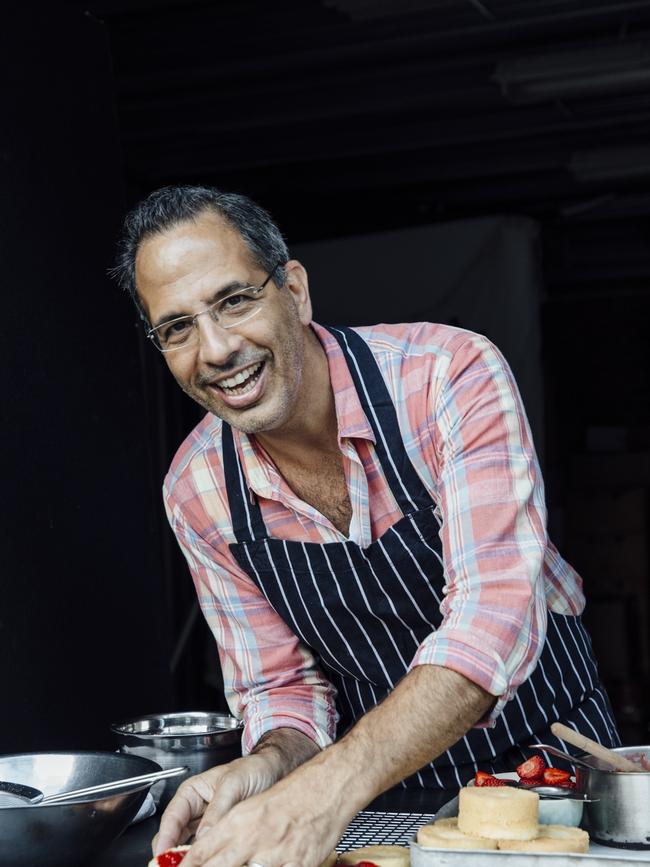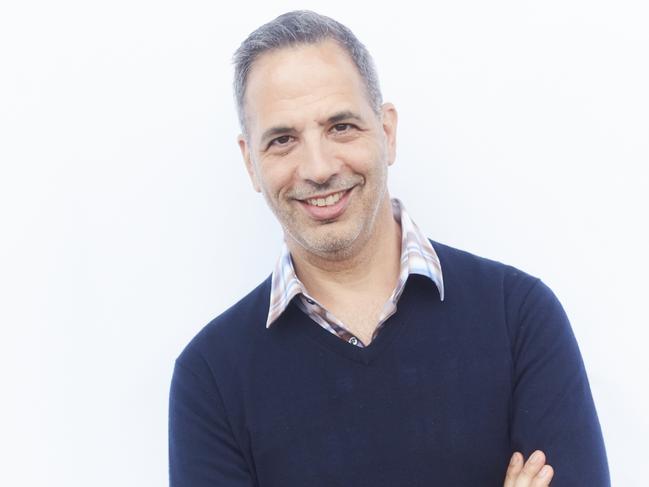Yotam Ottolenghi: Hot yet humble
His books are best-sellers, his TV shows top-raters, and his cooking is hailed as genius. Yet Yotam Ottolenghi somehow stays … nice.
SA Weekend
Don't miss out on the headlines from SA Weekend. Followed categories will be added to My News.
We have a new cuisine. “Just like French, German, Chinese, these days we say we’re having an Ottolenghi lunch.”
It’s a canny observation by a moderator teamed with globally beloved Israeli/British chef Yotam Ottolenghi, who starred at the recent Ubud Writer’s Festival in Bali.
Hundreds in an audience dominated by Aussies cheer the notion.
After all, a quick crowd survey reveals almost everyone here has a number of the chef’s seven bestseller cookbooks. Some possess the entire set.
Sydney journalist Joanna Savill’s role as moderator, leading Ottolenghi through three special events, appears breezy because there’s a reason why this chef is charming the world.
In person he is as warm, articulate, generous, charismatic and, in his own words, food “geeky”, as he so often appears on TV, regularly on Australian MasterChef and on his own award-winning SBS show, Ottolenghi’s Mediterranean Feast.
When Ottolenghi features, ratings go up.
When a new Ottolenghi book is released (his eighth is due out next year), sales rocket, and, when he is the guest at events, ticket sales boom.
Yet the father of two has no airs, talks freely about himself, his food love, and, despite a sweltering heatwave in Bali, he stays way overtime at every open-air event.
Every guest lining up for a selfie with the food doyen gets a piece of his time and a photo where he companionably drapes an arm around fans’ shoulders. It could be awkward, but he appears genuinely sociable and relaxed, like a long-lost friend.
Of about 25,000 seats at the Ubud festival’s 180 events in October, about half were filled by Australians and New Zealanders.

Janet DeNeefe, expat Aussie organiser of the fest she founded 16 years ago, says a whole new layer of foodies made the pilgrimage to Ubud this year, to meet Ottolenghi. Publishers call it the “Ottolenghi effect”.
Global sales of the “King of Cauliflower’s” seven cookbooks have topped five million, close to an estimated half a million in Australia alone.
“He’s so real, and he truly gets us as home cooks,” gushes one guest in a group from Adelaide who paid nearly $600 each to attend his three appearances at the festival.
Ottolenghi, 51, is of Jewish-Italian and German descent. He grew up in Ramat Denya, Jerusalem, became an academic and completed a thesis on the philosophy of the photographic image. He now lives in London with husband Karl Allen and their two children, Max, 6, and Flynn, 4, and owns six acclaimed London delis and restaurants.
In contrast to the likes of high-energy Jamie Oliver, outspoken Gordon Ramsay, and saucy Nigella Lawson, Ottolenghi is a sweetie. He is demure, thoughtful, humble, so eloquent and honest about his penchant for creating a flavour-packed, colourful mishmash of cultures on every plate.
He describes Ottolenghi cuisine as “international”. And it has evolved from inspiring chefs to also suit the slightly adventurous home cook.
The recipes cover all bases but, overall, gardened ingredients are the heroes. His next book, due later next year, is all about vegetable love.
Chapters on meat and fish dovetail into the vegetable, grain and pudding segments of his latest book, Simple.
Despite the simplicity of recipes of 10-or-less ingredients, it doesn’t veer from Ottolenghi’s consuming passions.
“The best thing when you eat are the wow and surprise moments,” he says. “Surprise and delight are what I love, and what I try and have in every single recipe I publish.”
Ottolenghi grew up in “the extraordinary city of Jerusalem, when it was a much more positive place than it is now”.
“As a family we used to go and eat in Jericho, Bethlehem or Jerusalem, or Annapolis,” he says. “All these places on the West Bank, which have now dropped off. At home, my parents are both of European descent, so that was the kind of food I grew up with. All around though, were all these incredible Middle Eastern flavours that I still love, cherish, and choose to cook with today. I’m lucky to have had all of these influences and experiences in my life.”
Ottolenghi says he is Israeli but, after 20 years of living in the UK, “I also feel British”. Jerusalem defines him, but “I have become a bit stateless, and I find that quite liberating”.
“It’s great to choose what you want to be in whatever way it suits you,” he says. When his first deli opened in 2002, the Ottolenghi food wasn’t labelled Middle Eastern or Israeli, or Palestinian, he says.
“The food could have anything in it. Yoghurt is not necessarily from that part of the world, and nor is chilli, coriander or shallots etc.”
He says people only started identifying his mix as Middle Eastern a decade later, after the release of his book, Jerusalem, written with friend, business partner and baker Sami Tamimi.
“This cookbook was a journey into our past, but our take on the food is pretty international, really,” he says.
The pair became friends because they had so much in common, in early days both working at London’s Baker and Spice, Ottolenghi as a pastry chef, and Arab-Palestinian Sami as a baker. They grew up in the same place and Hebrew was their first language. They never dreamed of writing a cookbook, nor about Jerusalem, which Ottolenghi describes as a place of beauty and heritage, “and a place where you look backwards. It’s traditional, and spiritual”.
As young fellows, the pair couldn’t wait to escape it.
“Then, once we started reminiscing about where we used to go to buy our nuts and seeds and all those things, even taking a virtual walk through the city, we quickly knew we did, after all, want to write this book,” Ottolenghi says.
“I took it upon myself to write the narrative and Sami was more active with the recipes. It all came together when we started testing them on friends and family at these wonderful Friday night dinners. Everyone was shocked by our level of detail, taking notes. We are both terrible perfectionists.
“I find it hard to say goodbye to a recipe and not improve it some more. It makes for good recipes at the end, but the process can be painful.”
The global Ottolenghi cuisine has put a new world of ingredients into many home larders. Simple suggests a must-have list of everyday ingredients such as olive oil, onions and garlic, and then the “Ottolenghi list” of sumac, za’atar, Urfa chilli flakes, ground cardamom, pomegranate molasses, rose harissa, tahini, barberries, black garlic, and preserved lemon. All exotics, and now available in specialty stores or online in Australia.
Ottolenghi studied philosophy, and worked as a newspaper editor, “but cooking had such an immediate gratification for me”.
“Eventually, I couldn’t resist,” he says. “I suppose it’s never too late to start doing what you love.”
He studied French cooking at Le Cordon Bleu in London, a pivotal time, if not key to his food fame.
“French is the language in which European cooking was codified. Training at a cooking school, any school, is incredibly important to develop a talent, learn the basics and to be exposed to a breadth of techniques, but a professional working kitchen couldn’t be more different,” he says, insisting practical experience is essential.
Ottolenghi believes the Australian appetite for his recipes is because they translate well to our climate, “and to your celebration of produce and home-entertainment culture”.
“Whenever I’m in Australia I have the most incredible time meeting so many people who enjoy what I do and who are so enthusiastic to share their food joys.
“I absolutely love the Australian food scene,” says the man who specialises in unique fusions. “It’s wonderful how Australian chefs draw inspiration from so many neighbouring cultures or their own migrant population, and yet still manage to create their own distinct voice and world-class cuisine.”

Ottolenghi unashamedly acknowledges that lowering food waste in his businesses, has been handy inspiration. He quickly developed a sensitivity to the “visuals”.
“We call it the food smiles. Our chefs know that if the food is not smiling, they need to fix it,” he laughs. “Anyone who sells food for a living will tell you that if food doesn’t look good, it doesn’t sell.”
But, isn’t some of the best food brown?
“What Sami and I did (with Middle Eastern food) was modernise it, and make it look less brown,” he says with a chuckle.
“For instance, hummus is a whole ceremony of food, a whole meal, but it is – pale brown. It needs pickled onion, pickled chilli or salsa on top to make it sparkle, but that also gives it a different dimension of flavour, makes it more accessible and maybe a bit more fetching.”
While Simple lists those 10 essentials, Ottolenghi’s own ingredient preferences are ever-changing. Chilli is a mainstay, “not always about intense heat”.
“I’ve been using Cascabel chilli a fair bit recently. It’s a mild chilli with a gentle nutty flavour that can be used for flavouring oil, marinating, and for a gentle warmth in desserts.”
As Ottolenghi’s cuisine evolves, he is reaching into more cooking cultures
“Miso is another ingredient I’ve used a lot recently. It enhances the umami in sweet and savoury dishes, and is so incredibly useful.”
At home, with two young boys, and challenged by his family’s thumbs up, or down, food-rating system, Ottolenghi hopes his children will benefit from the one thing that drew him into the kitchen: “that there was always a conversation about food”.
“Children need to see you cook, see the ingredients and know what they are.”
At age six, the discerning young Max communicates his approval by giving his dad’s pizza with basil pesto and feta the nod with an enthused double thumbs up.
